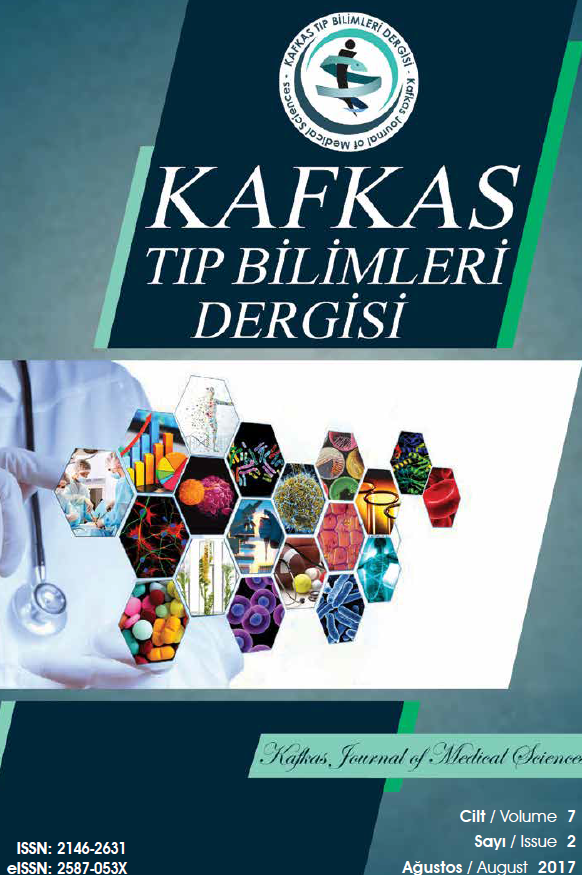Epilepsili Hastalarda Uyku Bozuklukları ve Bunun Yaşam Kalitesine Etkisi
Epilepsi, Uyku bozuklukları, yaşam kalitesi
Sleep Disturbances in Patient with Epilepsy and its Effect on the Quality of Life
Epilepsy, sleepdisturbance, quality of life,
___
- 1-Stables JP, Bertram EH, White HS, et al. Models for epilepsy and epileptogenesis: report from the NIH workshop, Bethesda, Maryland. Epilepsia2002; 43:1410-20.
- 2-Sammaritano M, Gigli GL, Gotman J. Interictalspiking during wakefulness and sleep and the localization of foci in temporallobeepilepsy. Neurol 1991; 41(2):290-7.
- 3-Malow BA, Lin X, Kushwaha R, et al. Interictal spiking increases with sleep depth in temporal lobe epilepsy. Epilepsia.1998; 39(12):1309-16.
- 4-Minecan D, Natarajan A, Marzec M, et al. Relationship of epileptic seizures to sleep stage and sleep depth.Sleep 2002; 25(8):899-904.
- 5-Crespel A, Coubes P, Baldy-Moulinier M. Sleep influence on seizures and epilepsy effects on sleep in partial frontal and temporal lobe epilepsies. Clin Neurophysiol. 2000; 111(2):54-9.
- 6- Göksan B. Uyku ve epilepsi. Türkiye Klin Dahili Tıp Bil Nörol 2007; 3(26): 40–3.
- 7- Fidaner H, Billington R, Eser E, et al. Yaşam kalitesi ve ruh sağlığı. 34. Ulusal Psikiyatri kongresi Bilimsel Çalışmalar Özet Kitabı 1998; 53-6.
- 8-Manocchia M, Keller S, Ware JE. Sleep problems, health-related quality of life, work function in gand healthcare utilization among the chronically ill. Qual Life Res.2001; 10(4): 331-45.
- 9-Harden CL. Theco-morbidity of depression and epilepsy: epidemiology, etiology, andtreatment. Neurol 2002; 24(59):48-55.
- 10-Öner P, Barut Y, Öner Ö, et al. Çocuklarda uyku ölçeğinin geçerlik ve güvenirliği. Klin Psikofarmakol Bül 2009; 19:382–95.
- 11-Vaughn, BV, D'Cruz OF. Sleepandepilepsy. Semin Neurol. 2004; 24 (3):301-13.
- 12-Devinsky O, Ehrenberg B, Barthlen GM, et al. Epilepsy and sleep apne asyndrome. Neurol 1994; 44 (11):2060-4.
- 13- Ağargun MY, Kara H, Anlar O. Pittsburgh uyku kalitesi indeksinin gecerliliği ve guvenirliği. Tr Psikiyatri Derg 1996; 7(2):107-15.
- 14- Netzer NC, Stoohs RA, Netzer CM, et al. Using the Berlin Questionnaireto identify patients at risk forthe sleep apnea syndrome. Ann Intern Med 1999; 131(7):485-91.
- 15- Abrishami A, Khajehdehi A, Chung F. A systematic review of screening questionnaires for obstructive sleep apnea. Can J Anaesth 2010; 57(5):423-38.
- 16-Hoddes E, Zarcone V, Smythe H, et al. Quantification of sleepiness: a newapproach. Psychophysiol 1973; 10(4):431-6. 17-MacLean AW, Fekken GC, Saskin P, et al. Psychometric evaluation of the Stanford Sleepiness Scale. J Sleep Res 1992; 1(1):35-9.
- 18-Izci B, Ardic S, Firat H, et al. Reliability and validity studies of the Turkish version of the Epworth Sleepiness Scale. Sleep Breath 2008; 12(2):161-8.
- 19-Johns MW. A new method for measuring day time sleepiness: the Epworth sleepiness scale. Sleep 1991; 14 (6):540-5.
- 20-Weerd AD, Hass SD, Otte A, et al. Subjective sleep disturbance in patients with partialepilepsy; a qestionnaire based study on prevalance and impact on qality of life. Epilepsia 2004; 45(11):1397–1404.
- 21-Piperidou C, Karlovasitou A, Triantafyllou N, et al. Influence of sleep disturbance on quality of life of patients with epilepsy. Seizure 2008; 17:588–94.
- 22-Chen NC, Tsai MH, Chang CC, et al. Sleep quality and day time sleepiness in patients with epilepsy. Acta Neurol Taiwan 2011; 20:249–56.
- 23- lobucnikova K, Kollar B. Day time sleepiness andchanges of sleep in patients with epilepsy. Ġn: Sibat HF (ed). Novelaspects on epilepsy. InTech; 2011; Ch 3, 29–52.
- 24- Krishnan P, Sinha S, Taly AB, et al. Sleep disturbances in juvenile myoclonic epilepsy: a sleep questionnaire-basedstudy. Epilepsy Behav 2012; 23(3):305–9.
- 25-Mattson RH. Selection of antiepileptic drug therapy. In: Levy R, Mattson RH, Meldrum B, Penry JK, editors. Anticepticdrugs, 3rd ed. 1989. pp. 103-5.
- 26- Zucconi M, Oldani A, Smirne S, et al. The macrostructure and microstructure of sleep in patients with autosomal dominant nocturnal frontall obeepilepsy. J ClinNeurophysiol 2000; 17(1):77-8.
- 27-Wyler AR, Weymuller EA. Epilepsycom plicatedbysleep-apnea. AnnNeurol 1981; 9:403-4.
- 28-Manni R, Tartara A. Evaluation of sleepiness in epilepsy. Clin Neurophysiol 2000; 111:111-4.
- 29-Davinsky O, Eherenberg B, Barthlen GM, et al. Epilepsy and sleep-apnea syndrome. Neurol 1994; 44:2060-9.
- 30-Khatami R, Zutter D, Siegel A, et al. Sleepwake habits and disorders in a series of 100 adult epilepsy patients– a prospective study. Seizure 2006; 15:299–306.
- 31-Chan B, Cheong EYY, GraceNg SF, et al. Evaluation of sleep disturbances in childrenwith epilepsy: a questionnaire-basedcase–control study. Epilepsy Behavior 2011; 21:437–40.
- 32-Kwan P, Yu E, Leung H, et al. Association of subjective anxiety, depression, and sleep disturbance with quality-of-liferatings in adults with epilepsy. Epilepsia. 2009; 50(5):1059-66.
- 33-Jones JE, Hermann BP, Barry JJ, et al. Clinical assessment of axis I psychiatric morbidity in chronic epilepsy: a multicenter investigation. J Neuropsychiatry ClinNeurosci 2005; 17:172–9.
- 34-O’Donoghue MF, Goodridge DMG, Redhead K, et al. Assessing the psychosocial consequences of epilepsy: a community-based study. Br J Gen Pract 1999; 49:211–4.
- 35-Manni R, Politine L, Ratti MT, et al. Sleepiness and its associated factors in epilepsy patients. Sleep 1998; 21:175. [Abstract]
- 36-Wiegartz P, Seidenberg M, Woodard A, et al. Co-morbid psychiatric disorder in chronic epilepsy: recognitoin and etiology of depression. Neurol 1999; 53:3-8.
- 37- Gilliam F. Optimazinghealthoutcomes in activeepilepsy. Neurol 2002; 58:9-20.
- ISSN: 2146-2631
- Yayın Aralığı: Yılda 3 Sayı
- Başlangıç: 2011
- Yayıncı: Kafkas Üniversitesi
Total Tiroidektomi Sonrası Hipokalsemi
Kars İli Özefagus Endoskopik Biyopsi Sonuçları
Yasemin ADALI, Hüseyin Avni EROĞLU, Gülname Fındık GÜVENDİ
Primer Kranial Kist Hidatik Plejinin Nadir Nedeni: Olgu Sunumu ve iteratrn Gözden Geçirilmesi
İdris ALTUN, Kasım Zafer YÜKSEL
Demet ÜNALAN, Ferhan SOYUER, Mustafa BAŞTÜRK, Ferhan ELMALI
Kudret Cem KARAYOL, Ali BİLGE, Sunay Sibel KARAYOL
Kars Yöresi Alt Gastrointestinal Endoskopik Biyopsi Sonuçları
Gülname Fındık GÜVENDİ, Hüseyin Avni EROĞLU, Yasemen ADALI
Epilepsili Hastalarda Uyku Bozuklukları ve Bunun Yaşam Kalitesine Etkisi
Şadiye GÜMÜŞYAYLA, Gönül VURAL
Barış YILMAZ, Cem ÇOPUROĞLU, Mert ÖZCAN, Mert ÇİFTDEMİR, Erdi İMRE, Nurettin HEYBELİ
Helicobacter Pylori: Patofizyoloji, Sıklık, Risk Faktörleri, Tanı ve Tedavi
